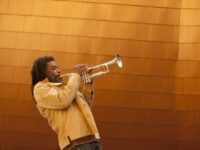If you trace through Wadada Leo Smith’s discography far enough, you’re bound to find songs that he dedicates through the titles to people he’s deeply admired: from Don Cherry to Martin Luther King, Jr. to his mother (“Sarah Bell Wallace”). Najwa, now out through TUM Records, is an entire album of dedications, devoted almost exclusively to late, great jazz luminaries.
Part of the reason for Smith’s remarkable consistency despite the volume of recordings he issues with each exploring a different angle is his tendency to find a topic of focus for each project. Najwa is no exception in that regard, but the other point of intrigue is that he enlists not one not two not three but FOUR electric guitarists. Having more axes on board than Molly Hatchet might raise some eyebrows — especially for a jazz combo — but he’s done this before: behold disc 2 of the 2009 double CD Spiritual Dimensions. That’s his Organic band, which boasted guitarists Henry Kaiser, Michael Gregory Jackson, and Smith’s then thirteen-year-old grandson, Lamar Smith, as well as Nels Cline. Swap Cline for Brandon Ross (Harriet Tubman), leave behind the cellist and second bassist and you essentially have what’s being presented on Najwa.
Kaiser is the first name that stands out, for the obvious reason of his well-received pairing with Smith on the Yo Miles! project that’s been one of the most successful re-invigorations of Davis’ 70s electric period. Michael Gregory Jackson goes even further back with Smith, connecting when Smith moved to Jackson’s New Haven, CT hometown in the 70s and the trumpet master appeared on Jackson’s 1976 Clarity debut.
These guitars aren’t deployed all at once; Smith uses them seemingly one or two at a time to effectively carry out the music as a small combo. We don’t know even through the extensive, liner notes inside the CD cover which guitarist is playing what part, which aligns with Smith’s intent for the guitars to play democratic roles within the band.
Moreover, Smith has always understood how to play effectively alongside even the loudest and audacious guitars, like what can be heard on the barbed “Ornette Coleman’s Harmolodic Sonic Hierographic Forms: A Resonance Change in the Millennium,” where his horn evokes Miles circa Jack Johnson. Nonetheless, it’s the feisty drumming from Pheeroan akLaff and Bill Laswell’s teeming bass footprint that take the center stage for the first half while Smith’s piercing trumpet phrases taking back the lead in the suspended, vaguely reggae second half.
Propelled by akLaff’s and percussionist Adam Randolph’s relentlessness along with Laswell’s probing on “Ohnedaruth John Coltrane: The Master of Kosmic Music and His Spirituality in a Love Supreme,” Smith delivers alternatively aching and attacking phrases, adeptly leveraging the silence in-between to become part of the impact. Here, too, a second, slower section emerges, one filled with a funkified Caribbean groove that’s arresting enough to justify its own damned track.
Stuck in the middle of these extended jams is the centerpiece title song, a paean not to a deceased jazz great but to an unnamed “lost love”. It’s an ambient piece of eerie beauty, made so by Smith’s exposed muted trumpet and more so by Laswell’s post-session mix.
Ronald Shannon Jackson and his 80’s free funk band the Decoding Society wasn’t just a source of inspiration for Smith, the trailblazing drummer was also a friend who was for a time in Smith’s Golden Quartet. “Ronald Shannon Jackson: The Master of Symphonic Drumming and Multi-Sonic Rhythms, Inscriptions of a Rare Beauty” shares the rhythmic drive of the Decoding Society, but the strong, free-spirited personalities of Smith, AkLaff and Laswell assure that the admiration doesn’t cross over to the level of imitation.
And finally, Smith pays tribute (once again) to Billie Holiday. “The Empress, Lady Day: In a Rainbow Garden, with Yellow-Gold Hot Springs, Surrounded by Exotic Plants and Flowers” shares that same gaunt aura as “Najwa”, extended trumpet notes lightly augmented by an acoustic guitar conveying a sense of a ghostly presence.
Wadada Leo Smith has never been one to conceal his influences but when he celebrates the geniuses who motivated him, it’s his own genius that becomes the most illuminating thing in his music. Najwa is one of those particularly bright moments in a catalog full of them.
- David Torn – ‘Adityahridayam 321’ (2024) - May 5, 2024
- Ivo Perelman + Matthew Shipp – ‘Magical Incantation’ (2024) - May 4, 2024
- Tomeka Reid Quartet – ‘3+3’ (2024) - April 30, 2024



